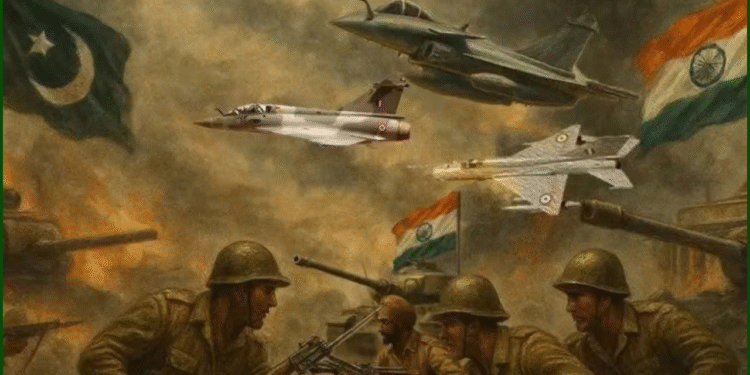Pakistan’s National Security Committee (NSC) has granted its armed forces full authority to respond to recent Indian airstrikes with actions “at a time, place, and manner of their choosing,” escalating tensions between the two nuclear-armed neighbors. The decision follows a series of coordinated missile, air, and drone attacks by India on May 6–7, which targeted civilian areas across Punjab and Azad Jammu and Kashmir, killing 26 civilians and injuring 46 others.
Indian Airstrikes Target Civilian Areas
According to the NSC, the Indian Armed Forces launched 24 strikes on six locations, including Sialkot, Shakargarh, Muridke, Bahawalpur, Kotli, and Muzaffarabad. The attacks, which India justified as targeting “terrorist camps,” resulted in significant civilian casualties and damage to infrastructure, including mosques and the Neelum-Jhelum Hydropower Project.
Lieutenant General Ahmed Sharif Chaudhry, Director General of Inter-Services Public Relations (DG ISPR), detailed the human toll during a press briefing. In Bahawalpur’s Ahmedpur East, 13 civilians, including two three-year-old girls, seven women, and four men, were killed, with 37 others injured. In Muzaffarabad, a strike on Bilal Mosque claimed three lives and injured two children. In Kotli, the Abbas Mosque was hit, killing a 16-year-old girl and an 18-year-old boy, and injuring a woman and her daughter. Five additional civilians, including a five-year-old child, were killed by Indian firing along the Line of Control.
The NSC condemned the strikes as “unprovoked, cowardly, and unlawful,” asserting that India’s claims of terrorist camps were baseless. Pakistan had previously invited international media to inspect the alleged sites on May 6, with further visits planned for May 7, but the NSC claims India launched the attacks to avoid scrutiny of its “falsehoods.”
Targeting of Dam Sparks Outrage
A particularly contentious aspect of the Indian operation was the targeting of the Nauseri Dam, part of the Neelum-Jhelum Hydropower Project. Lt. Gen. Chaudhry described this as a “dangerous escalation,” warning that attacks on water infrastructure violate international humanitarian law. “This is an unacceptable act that raises serious questions about India’s compliance with global conventions,” he said.
The strikes also endangered international civil aviation, with 57 commercial flights, including those from Gulf countries, transiting Pakistani airspace during the operation. “India’s recklessness put thousands of passengers at risk,” Chaudhry noted, emphasizing that Pakistani aircraft did not cross into Indian territory and that Indian aircraft were prevented from entering Pakistan.
Pakistan’s Response and International Appeal
The NSC invoked Article 51 of the UN Charter, affirming Pakistan’s right to self-defense, and praised the Pakistan Air Force for downing five Indian fighter jets and one drone during defensive operations. The committee warned that Pakistan is prepared to respond to further provocations and urged the international community to hold India accountable for its actions.
“India’s deliberate escalation risks destabilizing the region,” the NSC statement read. “Global powers must take notice of these unlawful acts and their potential consequences.”
The DG ISPR reiterated Pakistan’s commitment to sovereignty, stating, “Our armed forces are fully prepared to defend the nation. We reserve the right to respond to aggression on our terms.”
A Region on Edge
The latest escalation follows a pattern of heightened tensions between India and Pakistan, particularly since an April 22 attack that Pakistan offered to investigate transparently—an offer India rejected. The NSC accused India of pursuing “short-sighted political objectives” at the expense of civilian lives and regional stability.
As both nations brace for potential further conflict, the international community faces growing pressure to intervene and prevent a broader crisis in South Asia.

















































